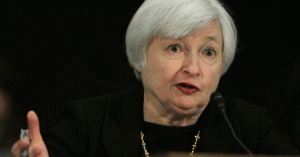In an inscrutable move that has alarmed state treasurers, the Federal Reserve, along with the Federal Deposit Insurance Corporation and the Office of the Comptroller of the Currency, just changed the liquidity requirements for the nation's largest banks. Municipal bonds, long considered safe liquid investments, have been eliminated from the list of high-quality liquid collateral. assets (HQLA). That means banks that are the largest holders of munis are liable to start dumping them in favor of the Treasuries and corporate bonds that do satisfy the requirement.
Muni bonds fund the nation's critical infrastructure, and they are subject to the whims of the market: as demand goes down, interest rates must be raised to attract buyers. State and local governments could find themselves in the position of cash-strapped Eurozone states, subject to crippling interest rates. The starkest example is Greece, where rates went as high as 30% when investors feared the government's insolvency. Sky-high interest rates, in turn, are the fast track to insolvency. Greece wound up stripped of its assets, which were privatized at fire sale prices in a futile attempt to keep up with the bills.
The first major hit to US municipal bonds occurred with the downgrade of two major monoline insurers in January 2008. The fault was with the insurers, but the taxpayers footed the bill. The downgrade signaled a simultaneous downgrade of bonds from over 100,000 municipalities and institutions, totaling more than $500 billion. The Fed's latest rule change could be the final nail in the municipal bond coffin, another misguided move by regulators that not only does not hit its mark but results in serious collateral damage to local governments -- maybe serious enough to finally propel them into bankruptcy.
Why this unprecedented move by US regulators? It is not because municipal bonds are too risky, since corporate bonds with lower credit ratings are accepted under the new rules. Nor is it that the stricter standard is required by the Basel Committee on Banking Supervision (BCBS), the BIS-based global regulator agreed to by the G20 leaders in 2009. The Basel III Accords set by the BCBS are actually more lenient than the US rules and do not include these HQLA requirements. So what's going on?
From the Inscrutable, Unaccountable Fed
The rule change was detailed by Pam Martens and Russ Martens in a September 4th article titled "The Fed Just Imposed Financial Austerity on the States." They write that on September 3rd:
The Federal regulators adopted a new rule that requires the country's largest banks -- those with $250 billion or more in total assets -- to hold an increased level of newly defined "high quality liquid assets" (HQLA) in order to meet a potential run on the bank during a credit crisis. In addition to U.S. Treasury securities and other instruments backed by the full faith and credit of the U.S. government (agency debt), the regulators have included some dubious instruments while shunning others with a higher safety profile.
Bizarrely, the Fed and its regulatory siblings included investment grade corporate bonds, the majority of which do not trade on an exchange, and more stunningly, stocks in the Russell 1000, as meeting the definition of high quality liquid assets, while excluding all municipal bonds -- even general obligation municipal bonds from states with a far higher credit standing and safety profile than BBB-rated corporate bonds.
This, rightfully, has state treasurers in an uproar. The five largest Wall Street banks control the majority of deposits in the country. By disqualifying municipal bonds from the category of liquid assets, the biggest banks are likely to trim back their holdings in munis which could raise the cost or limit the ability for states, counties, cities and school districts to issue muni bonds to build schools, roads, bridges and other infrastructure needs. This is a particularly strange position for a Fed that is worried about subpar economic growth.
Not Sufficiently Liquid?
In a September 3rd press release, Federal Reserve Governor Daniel K. Tarullo stated that while "most state and municipal bonds are not sufficiently liquid to serve the purposes of HQLA in stressed periods . . . the liquidity of some state and municipal bonds is comparable to that of the very liquid corporate bonds that can qualify as HQLA." [Cite] Criteria were being developed, he said, for considering these assets. But "it is important to get this final rule adopted now, so that the largest banks can begin to prepare for its implementation on January 1." In the meantime, muni bonds are in limbo, and it appears that most will still not be accepted as HQLA.
The regulators consider stocks to be more liquid than muni bonds because they are readily traded on the stock market. But as the Martens' note, stock markets can be quite inaccessible in a crisis. Quoting from the Fed's own archives on the crash of 1987:
Market makers in the over-the-counter market were not obligated to maintain an orderly market and many withdrew from trading. Delays in processing trades resulted in investors receiving prices very different from what they expected. Many brokers did not answer their phones, leaving investors unable to reach them. Erratic price movements and quotes resulted in frequent lock-ups in the electronic trading system used in the over-the-counter market.
In any case, switching the banks' holdings from muni bonds to corporate bonds or Treasuries is liable to have little effect in a crash. The stricter rules are supposed to be a defense against bank runs; but in a major derivatives bust and bail-in, the available collateral will go first to the derivatives claimants, through a massive concession to financial institutions in the Bankruptcy Reform Act of 2005. (See my earlier article here.) The FDIC and the depositors are both liable to be out of luck, no matter what form the collateral takes.
The Martens' conclude:
(Note: You can view every article as one long page if you sign up as an Advocate Member, or higher).






